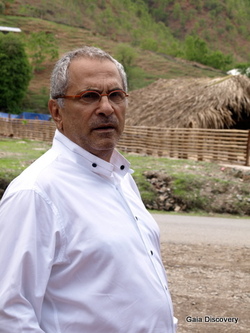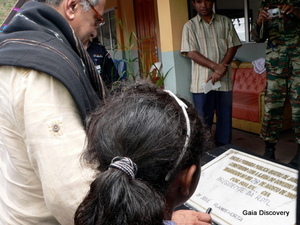by Mallika Naguran
Singapore, 26 January 2009. What can a new and small republic like Timor-Leste do to reverse carbon emissions? Quite a lot, apparently.
 Dr Horta: Asians to lead Asians.
Dr Horta: Asians to lead Asians.The President of Timor-Leste, Dr Jose Ramos-Horta told Gaia Discovery in an exclusive interview at his residence in Dili on 27 December 2009 that countries should get over the stalemate that strangled positive outcomes at the Climate Change Summit in Copenhagen in December 2009.
“No point in engaging the blame game,” said President Ramos-Horta, referring to developing countries' stance on developed countries for their previous polluting efforts. “It makes Americans and the West defensive.”
Asians should resolve the global climate change crisis in their own style. “I would like to propose the formation of an Asian Climate Change Summit,” said President Ramos-Horta.
“Within this platform, each country sets its own targets and gets technical experts to institute measurements to chart the progress.” This “constructive, conciliatory” summit can be held once a year, while ministers from the Asian countries can review the outcome every three or five years.
An Asian-focused consultative platform will not ignore the related issues of poverty, health and education. These should be incorporated in the broad environmental agenda to curtail greenhouse gas emissions.
It is a chance for “Asians to take the leadership for Asians”, he said.
Through this approach, “there is no appearance of infringing on the secrecy, like inspection”, said President Ramos-Horta. He was referring to US’ demands on inspecting China’s nuclear power facility, a stumbling block during the Copenhagen meet.
 More investment in education needed.
More investment in education needed.The summit can be financed from a voluntary fund set up by the member countries, suggested the President. “Let’s say 100 billion dollars over ten years to assist Least Developed Countries, Small Island Developing States and poor Asian countries to cope with climate change and deforestation issues,” he said.
“This works out to 10 billion dollars a year, and funding can come from any Asian contributor,” said Mr Ramos-Horta, suggesting that China, Japan and Korea could be the biggest funders.
“The most important (investment) is in improving education. Because it is only with education that people will know how to cope better with the environment,” said the learned man of many letters and the 1996 Nobel Peace Prize laureate.
Photography by Mallika Naguran.
Related Articles on Gaia Discovery:
Fancy a trip up to Timor Leste? Read about the charms of Viqueque - caving, cockfights and plenty of soothing countrysides.